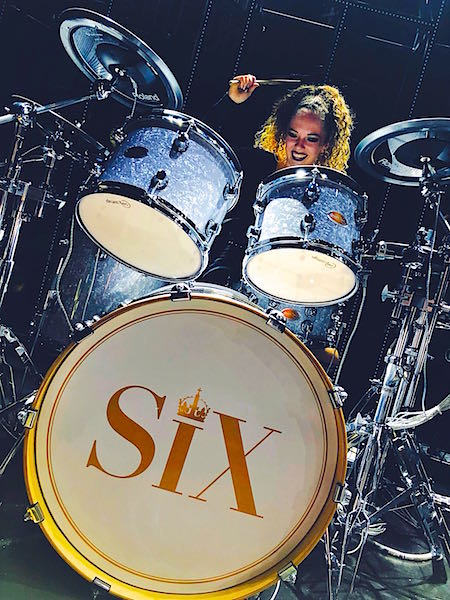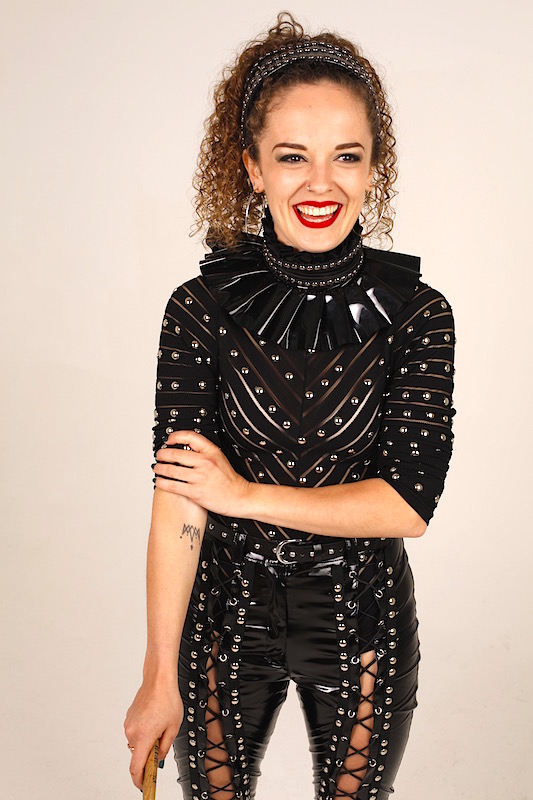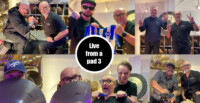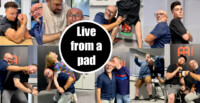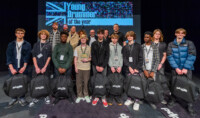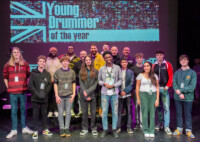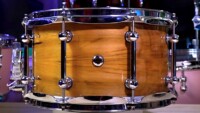The West End scene – even more so than the rest of the music industry – is still dominated by male musicians. While female drummers are rare in London’s pits, female MDs are even rarer.
One musical setting an example with an all-female band on stage is ‘Six’ – a modern retelling of the lives of the six wives of Henry VIII packed up in a rock show.
Holding down the groove for this powerful show since the beginning – and with that not only being one of the (too) few female drummers but also one of the youngest Westend musicians out there:
Alice Angliss
– Six – Miss Saigon –
 Starting off on piano and oboe at an early age, Alice’s head was turned when hearing her school’s percussion ensemble play an arrangement of ‘Every Little Thing She Does Is Magic’ by The Police at one of their concerts. The first percussion lesson followed soon at the age of 14. Her shy nature at school though somewhat kept her from trying out ‘cool’ instruments like the drum kit, and her teacher’s efforts to get her behind the kit remained fruitless. Having played piano for years Alice took to tuned percussion quite easily and the quick success motivated her to keep going.
Starting off on piano and oboe at an early age, Alice’s head was turned when hearing her school’s percussion ensemble play an arrangement of ‘Every Little Thing She Does Is Magic’ by The Police at one of their concerts. The first percussion lesson followed soon at the age of 14. Her shy nature at school though somewhat kept her from trying out ‘cool’ instruments like the drum kit, and her teacher’s efforts to get her behind the kit remained fruitless. Having played piano for years Alice took to tuned percussion quite easily and the quick success motivated her to keep going.
Later going to Oxford University for a music degree saw Alice move away from the performer angle and approach music from a more academic level.
The urge to get back on the instrument was too big though and she secured a spot to study at the prestigious Royal College of Music in London. It was here where Alice actually received her first drum lesson with session legend Ralph Salmins at the age of 21. Finishing music college started a widespread career of teaching and various orchestral gigs – but her passion for the musical theatre genre never wavered.
When Alice is not playing the drums on ‘Six’ she covers the show’s MD and piano role, or has been heard depping on the percussion chairs of other shows, such as Miss Saigon.
How did you start getting work in the West End?
I started off with a few ‘am-dram’ sort of places which would just be doing a show for a week for 50p *laughs*. But sometimes you meet people there who you cross paths with again further down the line. It’s just helpful to meet the people that are also trying to go down the same avenue as you because every now and then we’ve been able to help each other out.
Two of my friends from Uni now work as MD’s and I learned a lot from them about how the system works. They are both a bit older than me so they got started before me. That has been very helpful.
Sitting in with a few people really helped to see how it all worked, meet a few useful people and just be around the scene.
But I don’t really know what eventually got me in. It’s hard to say because there is so much luck involved. Just being in the right place at the right time.
I started doing fringe shows which are longer running and slightly better paid at places like the Park Theatre and Southwark Playhouse. They often put on really brilliant shows and are somewhat underrated because people are less aware of the fringe scene.
All of that is a fantastic learning experience because you usually don’t have a proper amount of rehearsal time and you can get a whole mixture of abilities within the band. Because of the budget, whoever gets booked gets booked, so you sometimes have some hurdles to get over. Including conductors.
I’ve done am-dram things where the MDs were not really MDs by profession. Sometimes it was just a member of the company – once it was a lawyer who could play some piano. That’s not to discredit them but I do think that maybe some people look down on it a bit, whereas I think if you come up through those sorts of experiences, then later on when something goes wrong on a show, you’ve been there; you’ve probably experienced something 100 times worse. Nothing surprises me now!
The current show again came up through a lucky meeting. I played on a kids/family show a couple of years ago and one of the producers subsequently got involved with ‘Six’ from the beginning. They did a little showcase to test the waters about one and a half years ago and he remembered me and put me forward for it. I stuck with it and watched it grow. I’ve been really lucky to get on board at the very beginning of something that’s turned into a huge success.
What are the main challenges of playing in musical theatre?
The one thing people ask me about most often is doing it again and again every night without going crazy. I must be well over 500 shows on ‘Six’ and it’s certainly a challenge to keep it fresh in your mind.
Another challenge I guess can sometimes be the dynamics within the company. We’re quite a small company; there are only 20 of us in the building on an average night. So everyone knows everyone – we all hang out together – which is mostly the loveliest thing but it does mean you can’t get away from anyone. There is no quiet corner I can go to for 5 minutes before the show to stretch, warm up or even just have a couple of minutes thinking to myself.
What was the hardest show you’ve ever played?
I’ve recently depped on the UK tour of Miss Saigon which was simultaneously the hardest and my favourite show I’ve ever done. I was on the percussion chair and it’s a really busy pad. You really have to know it inside out and there are a lot of moments where, if you accidentally pick up the wrong pair of sticks, you’re gonna screw yourself over for the next three minutes of the show. It’s almost choreographed: you have to do the right page turns, stick changes, spinning around to the right instrument in your set up… it was thrilling every single time I went in. I remember the first one I did: my brain had been so focused that when we got to the interval I really wanted a cigarette – and I have never smoked in my life!
That was definitely the hardest because it’s busy and it’s got every kind of demand. There are lyrical bits where you need to be very beautiful; but there are also more thunderous, marching-kind-of bits where you need to be powerful and passionate; and everything in between. I absolutely loved playing on that.
As a drummer I can just practise a show on my own kit at home. Where do you even practise an extensive percussion set up?
I’m very lucky to have a little studio in my garden. I sat in with Jim Wycherley who I was depping for, took the pad home and then did my best to build the set up at home. Now anyone who has heard the Miss Saigon soundtrack knows it’s full of gongs and unique Asian percussion instruments that I don’t own, so my studio looked quite funny for a while. I had everything that I did own out: my timps, my xylophone, various toys… and then I had large pieces of cardboard hanging from the ceiling that said “medium gong” or “large bao” on them. Even though these obviously didn’t make a sound when I hit them with a stick it was just about learning the choreography. I had to train myself that after this page turn I have to spin around and hit something there – even if I was just hitting thin air or a piece of cardboard for now. That was quite a strange set up. Any neighbours that might have seen me through the window dancing around hitting pieces of cardboard must have thought she’s finally lost it!
You come from a background of working with conductors but a lot of drummers won’t be used to that. What are the challenges there?
I guess a drummer is used to being the time-keeper so following somebody else might be quite a weird one. I come from playing in groups and orchestras so there has just always been a conductor. I’ve never really thought about it. Sometimes coming from a different background makes you worry that you’re at a disadvantage, but actually it’s important to remember that it can also mean you bring your own strengths because of the different experiences.
What’s your advice for players who want to prepare themselves for working in musical theatre?
Well the first thing (which they don’t need me to tell them) is to be absolutely smashing your instrument. Although sometimes a pad might come along that’s not that difficult, you won’t get to the point of playing that gig unless you’ve been through a bunch of stuff that’s way harder. So yeah, make sure you’re sh*t hot.
The second thing I would say is having the right mentality about it. You are often squeezed together in a small space with a group of people for months (or however long a show runs) and if you’re a pain in the ****, not friendly or difficult to work with it will make life hard and people won’t want to work with you again. I think personality plays a big role.
With the friendly approach in mind, try to keep all avenues open and see the opportunities in everything you do. There is always something to be taken from something – even if it doesn’t seem like a glamorous gig. Another thing I would say is that you never know who you’re gonna meet again. Don’t write someone off who you didn’t think was good or ‘not bother’ to impress them. You just never know – plus it’s just a lot nicer to be lovely to people!
So yeah: meet people, make a good impression, be keen and enthusiastic but not over the top and (if you can) do go and sit in with some people who are doing it already because you’ll learn a lot from watching how they handle the playing and how they interact with the company. If you do sit in make sure you go and say hello to the MD. It’s good to plant that seed. If one day in the future your name comes up they might remember you.
You’re a percussionist in the first right, so this is second nature for you; but how important is it to have a solid knowledge beyond ‘just’ the drum set? For example percussion, tuned percussion or electronics.
I think quite a lot of shows nowadays – sometimes for budget reasons – end up reducing a percussion pad and a drum pad into one. So having some basic knowledge of some pitched instruments like glockenspiel could be really useful. In those cases I think the drum pad tends to dominate because it’s probably more crucial, but it’s useful to at least be able to get around the basics, or willing to learn if you’ve never touched those things before. I’m definitely hoping to get my teeth into a more percussion-heavy pad next, whenever my time with ‘Six’ comes to an end.
Electronics are coming in more and more. I’m on an electronic kit on ‘Six’ but we’re actually not using it to the extent we could. The show is styled like a live gig so the creative decision was that on a live gig you wouldn’t use a different kit for each song, so we don’t change sounds much during the show.
There are other shows though that have loads of electronics in it and more of it is coming, so it’s gonna become more and more useful to know about. I was actually quite a novice on this before ‘Six’.
We use click tracks on almost all of the songs in the show and in our case the MD controls that. Part of the reason for that is because it’s also timecoded to the lighting design. That means it’s even more pressure on the MD but it makes the whole effect really neat and impactful.
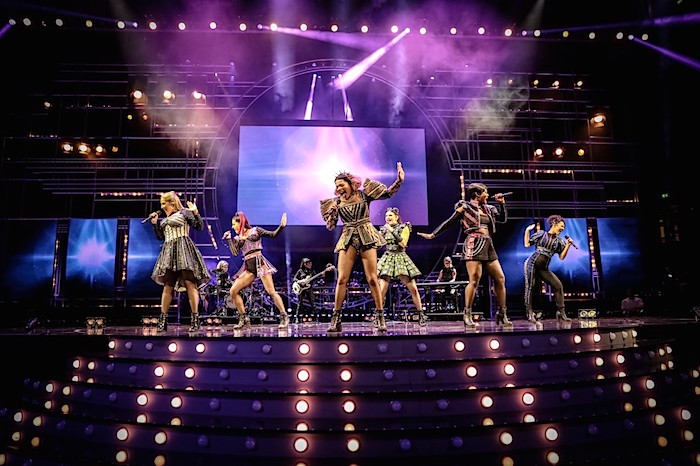 You’ve mentioned it earlier already: you play eight shows a week. How do you keep it fresh and interesting for yourself?
You’ve mentioned it earlier already: you play eight shows a week. How do you keep it fresh and interesting for yourself?
We actually do nine shows a week. Just for that extra dose of fun!
What I always tell people is that it’s the same pad every night but it’s never quite the same show. I’m lucky because we’re onstage in ‘Six’ so I actually get to watch the show, which is very helpful. If I was in a pit or a remote room I might switch off more but we have a slightly different cast on every night due to the rotation of the alternates so there is always something to watch.
An advantage of ‘Six’ is that it’s pop music so I can have a few moments of being creative each night: I can play a different solo, I can put some different fills in and so on. I try to take advantage of these moments otherwise you get stuck with your arms and legs on autopilot and your brain off.
I actually also cover the MD role, so occasionally I jump across to play keys and conduct the show. That’s absolutely terrifying but it’s something that definitely keeps it fresh be- cause I’m in a totally different job. It sounds strange but I like to get nervous again be- cause when you’re doing the same thing every night you don’t get nervous anymore. That’s a good thing because you’re calm, relaxed and there are all sorts of knock-on effects but actually having a little boost of adrenaline sometimes makes you come alive again. I do enjoy having that. Also when friends or contacts come to see the show. Even if you can’t see them, knowing they’re there really changes the experience. I definitely play up and feel a little nervous.
On your show ‘Six’ the whole band is on stage. How does this compare to being in a pit?
It’s strange, I actually found it really scary at first. When we started the tour last year and suddenly we were on stage in costume, I found that really really scary. A few weeks into the tour I thought: why do I find this scary? I’m used to playing in an orchestra where we’re all on stage all the time. I settled down a bit after that but it’s still funny to be seen all the time. In some ways it’s a really good thing because it keeps you alert all the time. In other ways I recently found that it brings its own challenges because you have to be in the mood and cant have a grumpy face on. If you’ve got things going on in your life I’ve discovered it can be incredibly difficult to put a smile on and look like you’re having the best time. But the show must go on. That has definitely been a new lesson for me recently – and something that I didn’t ever appreciate in actors when I went to see a play or a show. It never crossed my mind that they might be going through tough things in their personal lives and still have to come out to sing the perfect song and put on whatever emotion the storyline requires. That’s certainly a ‘con’ of being on stage but I think for me the ‘pros’ outweigh that. I really enjoy it now.
‘Six’ has a weird thing going. Because it’s styled on a gig and it’s supposed to be like a band rather than a musical theatre show, we ended up gaining the kind of fanbase that maybe a girlband would have. That has been very strange to me because it’s not what I was looking for and it’s been a total surprise. We now actually have a security guard at the theatre and people queue up for photographs and autographs. We even get letters, especially from young girls, who tell us they’ve been inspired by seeing us; there are Instagram fan accounts and people make memes out of us – it’s just so unusual because normally you’re hidden away in the pit and nobody knows who you are and what you do. It’s weird but very touching.
Being onstage also means that we can’t use sheet music and had to learn the whole show by heart. They actually forgot to tell me that when we started last year. I got to week two of the rehearsals and the bassist mentioned it to me in a lunch break. That was a bit of a shock but it’s certainly much nicer to have your head out of the book and interact with each other.
Another thing is that as female musicians in the West End, we are very much outnumbered by men. It’s nice to see that changing slowly and for that I think it’s underestimated how important role models are. Not that I would have ever called myself that but people have written in saying “Wow, I didn’t realise girls can do that” or “I’ve never seen a woman in charge of a show”. It takes us by surprise every time but it also makes us very very proud to maybe show people that that’s an option for them too. Six has a big girl-power vibe to it so a lot of teenage girls come to see it. We don’t need to make a big song and dance about it but just to see us has a big impact on people. On drums it’s still much more men than women but especially MD’s are overwhelmingly male at the moment. Particularly as it brings in issues around taking charge and leadership. It’s bigger than just playing the piano; it’s the role and status. I think it’s fantastic for young girls to see somebody in charge that isn’t the same as everyone else.
You’ve mentioned you’re playing an electronic drum kit in the show. So technology has quite an influence on the show?
Yes, we essentially have a silent pit. There is an acoustic guitar but apart from that everything is electronic – which means they have ultimate control at the sound desk and can deliver the absolute vision of our sound designer. That extreme control certainly is an advantage of going all electronic. I think it’s all just striving more and more towards this perfect package that is being presented to audiences now. It takes the element of chance out of it and means everything can be pretty much identical every night of the week. You could definitely get into a discussion about whether you’re killing the nature of live music by doing that but I think these days you get the impression that the audience wants perfection every single night.
Thanks a lot for your time Alice!
Interview Tobias Miorin
October 2019



